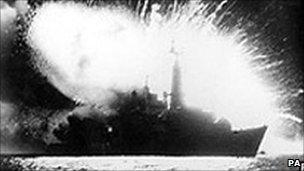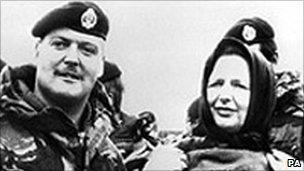Thatcher's war: The Falklands
- Published
Prime Minister Thatcher on the Falklands campaign at the 1982 party conference.
British reporters who found themselves in Buenos Aires during the Falklands war of 1982 naturally wondered if the British government was serious about retaking the islands.
After all, the Royal Navy was no longer properly equipped for expeditionary warfare. It had no fleet airborne radar, for a start.
Its planners and political masters (including the Conservative government) had decided that its main role would be anti-submarine actions against the Soviet navy.
Its big aircraft carrier, Hermes, without which the Falklands would probably not have been retaken, was to be sold to India and replaced by a smaller ship.
No hesitation
Radar cover would be provided by the RAF from land. No such land, of course, was available in the South Atlantic.
So it was suggested that the despatch of the Task Force was a bluff designed to get as good a face-saving diplomatic settlement as possible.
For me, such naive notions were dispelled by Mrs Thatcher herself.
The BBC in London fed House of Commons debates and prime minister's question time down the phone to us in the Sheraton Hotel.

The Royal Navy suffered losses
It was instructive listening and injected a dose of reality into the fantasies we had at odd moments entertained that the British government would not fight.
From her comments about the need to restore British sovereignty and her refusal to negotiate anything close to what the Argentine junta might accept (leaseback, a fixed term before a handover, shared rule, a UN protectorate), we knew that war was coming.
It turned out that she had not hesitated, having established in the first hours after the Argentine invasion that the Royal Navy thought a re-invasion could be carried out. The First Sea Lord Sir Henry Leach had told her that a task force could sail within days and it did.
US support
"We have to recover those islands," she said. "We have to recover them for the people on them are British and British stock and they still owe allegiance to the crown and want to be British."
She had decided that if the Argentines could be removed by diplomacy, then that would be fine. If they could not, then it would be war.
There then followed some difficult days during which Mrs Thatcher's resolve was tested.
The sinking of the Argentine cruiser Belgrano, the shock of HMS Sheffield going down (that it was a French missile which destroyed it only added to the humiliation), the steady loss of British ships to the daring Argentine air force - none of this shook her.

The war boosted Margaret Thatcher's political standing at home
The fact was that her basic instincts had been roused. She believed in the defence of what she saw as fundamental British interests.
The Falkland Islands may have been a couple of barren rocks inhabited mainly by sheep to some observers (President Reagan among them) but to Mrs Thatcher they were a British outpost.
They were not even an issue for argument. They became instead an issue for war.
And she soon got President Reagan to rally round. American air-to-air missiles followed.
Mrs Thatcher was always the practical grocer's daughter, knowing that words might lead the way but that weapons win wars.
Some of the tensions did show from time to time.
When South Georgia was recaptured early on, she made the announcement herself in Downing Street and, on being asked what would happen next, she turned back from returning inside to deliver to the cameras her famous instruction simply to "Rejoice!"
In overcoming the Argentines, she also overcame her political opponents at home and it was the war which set her up for an election win and many more years in power.